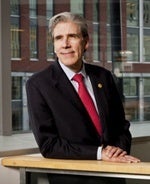[ Fall 2011 ]
The year 2001 saw not only the horrors of 9/11 and the anthrax attacks, but also the establishment of the UN Commission on Human Security. In its report to the General Assembly, the commission wrote that human security “means protecting people from critical and pervasive threats and situations, building on their strengths and aspirations. It also means creating systems that give people the building blocks of survival, dignity, and livelihood.” In a world of rapid global change, that is the timeless mission of public health.
Indeed, during the past decade, the health agenda has moved from the exclusive domain of medical and public health practitioners to take center stage among many different groups of experts as they address some of the most pressing issues of our time.
We now understand that:
- Good health is not just the result of economic development—it is one of the conditions for economic development to occur at all. Much of why some nations develop faster than others is that their people enjoy better health.
- Good health is key for national security and economic stability. Infectious disease pandemics can potentially kill thousands, disable millions, and disrupt entire economies. Investments in epidemiologic surveillance and response are crucial to controlling threats—whether natural or man-made.
- Good health underlies democratic governance and the realization of human rights. A comprehensive definition of health security includes access to health care as well as protection against the economic consequences of disease—so that no one goes broke for getting sick.
This issue of the Review offers a number of stories demonstrating Harvard School of Public Health’s broader sense of what constitutes global health security. The cover story on Theresa Betancourt, who for nearly two decades has worked with children traumatized by war, illustrates how HSPH researchers are trying to help promote resilience and healing in these young people. The School’s National Preparedness Leadership Initiative, co-led by Lenny Marcus and David Gergen, demonstrates that enlightened leadership in times of disaster is a quality that can actually be taught. Other stories on HSPH’s impact on malaria, military medicine, TB, and health inequities underscore how health is at the heart of global security.
The absence of good health, generated by the slow-burning persistence of huge inequities around the world, is one of the major causes of global insecurity. The injustice represented by the millions of unnecessary deaths from preventable causes breeds social discontent that may eventually lead to resentment and extremism. It is by improving health, addressing fundamental inequities, and preventing threats to well-being that we in public health can be leaders in bringing about true global security.
Julio Frenk is Dean of the Faculty and T & G Angelopoulos Professor of Public Health and International Development, Harvard School of Public Health
Dean’s Message: A Broader View of Global Security article pdf
